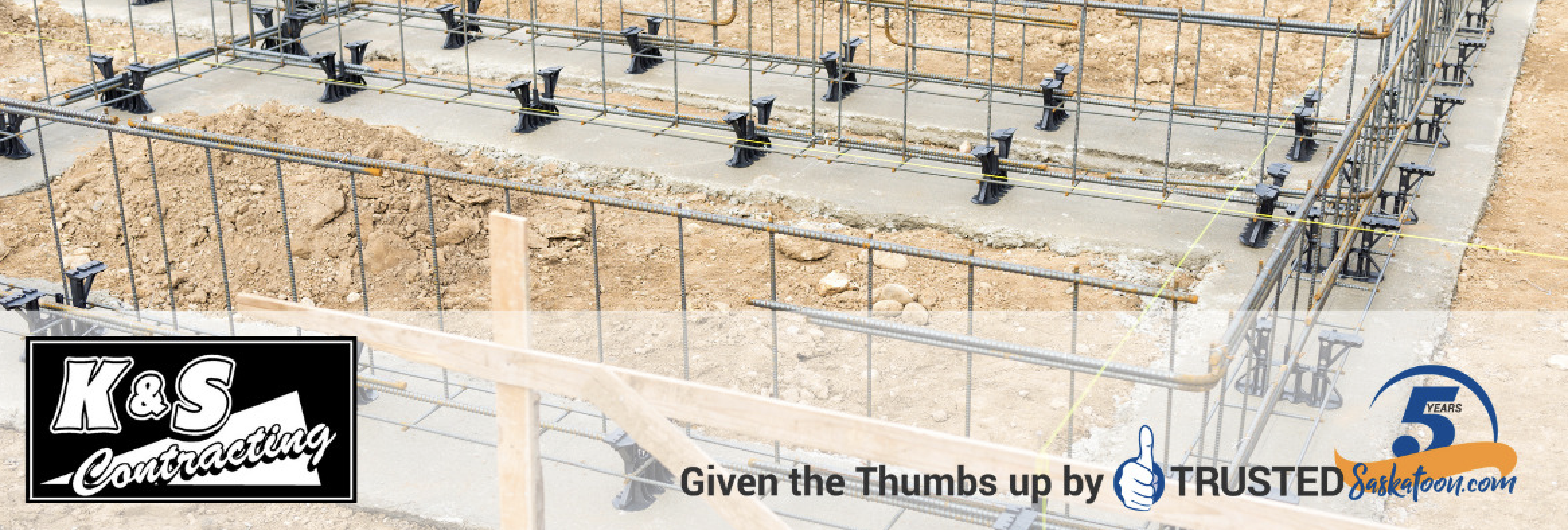K & S Contracting specializes in foundation repair for homeowners across Saskatchewan. In addition, they also offer general contracting services to Saskatoon and the surrounding area. In their latest Trusted Saskatoon tip, K & S Contracting, Trusted Saskatoon General Contractors, and foundation specialists, share the types of basement foundations.

There are 3 main basement foundations found in Saskatoon and the area, they are:
- Full Basement Foundations
- Daylight Basement Foundations
- Crawl Space Foundations
FULL BASEMENT FOUNDATIONS
This type of basement is generally found on a 2 story or a bungalow home. A bungalow is a home in which you walk up to the front door, and generally, there are only 1 or 2 steps to the door. Once you walk into the home you have a full staircase to go into the basement. A full staircase is 13 to 16 steps. For both a 2-storey or a bungalow the windows in these types of homes are smaller, generally the opening about 24 inches at ground level.
Full basements can either be finished or unfinished; finished basements are insulated and installed with drywall and flooring, providing living and storage space. Unfinished basements are not insulated and their walls and floors are left bare.
This type of basement is one of the most expensive foundations to build and can be susceptible to mould and moisture.
DAYLIGHT BASEMENT FOUNDATIONS
This type of home is generally found in a home with a walk-out basement. As their name suggests, daylight basements let in some natural light and aren’t as susceptible to mould or moisture. This type of basement is perfect for a homeowner who wants a patio or access from their basement to outdoors.
CRAWL SPACE FOUNDATIONS
Crawl space foundations are elevated several feet off footings, leaving a small protected space (usually three or four feet) between the ground and the base of the building. The foundation walls are built partially underground and shorter than basement foundation walls, making crawl spaces a happy medium between standard foundations and basement foundations. They are deeper than standard foundations and more shallow than basements.
Though they eliminate the possibility of having a finished basement, crawl spaces provide easier access to piping or plumbing than standard foundations. They also encourage more airflow underneath the building, which helps keep things cool in warmer climates. Crawl spaces are the least expensive type of basement foundation since they don’t require as much excavation.
K & S Contracting specializes in foundation repair for homeowners across Saskatchewan. In addition, they also offer general contracting services to Saskatoon and the surrounding area. In their latest Trusted Saskatoon tip, K & S Contracting, Trusted Saskatoon General Contractors, and foundation specialists, share the advantages of a walkout basement.

Walkout Basements are designed so you can walk out the main floor of your home. Quite often, this basement design incorporates a wall with windows and a door that you can walk out of on the ground level, and it may have a raised patio or covered roof from the upper floor of the house to cover this entrance.
Some of the advantages of a walk-out basement include full-size windows in your basement. Full-size windows allow more natural light into your space. If you are looking to grow plants or use a portion of this space as a workspace, it is always well lit naturally.
MORE LIVING SPACE
Generally, a walk-out basement is the same square footage as your upper living space, based on this, you have more living space. Walkout basements can be transformed into mudrooms that neatly hold shoes, backpacks and other items for coming in and out of the house. When put to its best use, a walkout basement provides endless ways to gain square footage in your home without enlarging its footprint.
ACCESS TO THE OUTDOORS
Because you have built your home with a walk-out basement, you literally have access to the outdoors from this level. Typically you will have a door that allows you to walk right into your backyard creating a hosting space or second living room that leads into the backyard for seamless entertaining; or as an indoor/outdoor playroom for the kids.
SEPARATE APARTMENT FROM YOUR WALKOUT BASEMENT
Based on the amount of space you have in your walkout basement, many people use this space to create a separate apartment. A private door to the outdoors makes a walkout basement ideal for a standalone apartment where older children can live or as a complete in-law suite for flexible multi-generational living. If you’re looking to supplement your income, you might consider turning your walkout basement into a rental apartment where the tenants can come and go as they please without needing access to your home from the side door.

Our mission continues to be saving you time, money, and stress when choosing locally-owned businesses that serve Saskatoon and the surrounding area. This article is to celebrate and recognize the latest Saskatoon Businesses that have been Trusted Saskatoon partners for at least 5 years!
Founder, Bradley Wiebe has been in the construction industry and installing windows and doors in Saskatoon and the surrounding area since 2004. Bradley grew up outside Saskatoon on a farm and has always known the meaning of hard work. He took pride in helping his dad and mom on the family farm, Wiebe Windows & More Ltd. was founded in 2015 and Bradley welcomed his wife Anna to the business in 2019. Prior to that, Anna used to work at Trusted Saskatoon as an account manager, so she knows what it means to be Trusted! Anna now looks after the day-to-day administrative tasks and helps manage projects from start to finish, even lending a hand on-site when needed.

What Wiebe Windows & More clients say:
"We did a lot of renovations this past year. We got to experience the challenges of dealing with poor trades in Saskatoon. Wiebe Windows & More is NOT one of those. Brad and Anna were great. Installation was done properly, and the finished work was great. Brad has gone way beyond with after-sales support and service. These are great honest people doing a great job." - Dan Canfield, Saskatoon
 K & S Contracting inc are Saskatoon General Contractors. Originally founded in 1998. At that time they operated part-time. They constructed decks and managed other small residential renovation projects. In 2007 they incorporated, it was at that time that Steve Ostapiw decided to expand the construction/ renovation business to a full-time operation specializing in foundations.
K & S Contracting inc are Saskatoon General Contractors. Originally founded in 1998. At that time they operated part-time. They constructed decks and managed other small residential renovation projects. In 2007 they incorporated, it was at that time that Steve Ostapiw decided to expand the construction/ renovation business to a full-time operation specializing in foundations.K & S are a small-town company, with small-town values working in the big city and they are committed to ensuring that they will never be too big to do the small jobs. They believe that every person and every project, no matter the size, deserves their time and attention.
At K & S Contracting, they take care of all of the paperwork, and that means as a customer you can be assured that the job is done right, according to all current codes and regulations.
- They apply for all building permits
- They follow all building codes
- All projects are structurally engineered
Steve, the founder, and lead coordinator is living his passion and he clearly enjoys working with clients on their projects. Steve manages his team by leading from the front and is a hands-on leader who delivers and demands a high quality of work and ethics.
What K & S Contracting clients say:
"We hired Steve to demolish our attached screened in porch and deck and repair the roof where it attached to the house. Once we were quoted the price and we accepted it, work began less than 5 days later. All the work was done very professionally and efficiently. We were impressed with the prompt service and are very happy with the finished product. There was some urgency to the job in order to not damage the existing house roof and we were appreciative of Steve responding to us in a timely manner. We would definitely use K&S again and would recommend them and would not hesitate to use them in the future." - Terry Ullman, Saskatoon

Born and raised in Saskatoon, Clark Dziadyk's tagline is "The Realtor in Your Neighbourhood"! Clark was taught what hard work meant at an early age while working for the family excavating business and he has carried that work ethic into his real estate practice. He has been involved in the building process of many homes, this experience afforded him a good knowledge about residential construction which he believes is a unique selling proposition as a Saskatoon Realtor®. He prides himself on the ability to be able to educate his clients and provide the highest level of service possible. His goal with each and every client is to gain their trust so they feel comfortable referring his name to their family and friends. What Clark's clients say:
"If you’re looking for a realtor that will listen to you and work WITH you then Clark is your guy! He is not only incredibly experienced and knowledgeable but also relatable, real and instantly trustworthy. He took a great deal of time at the beginning of the search process to discover exactly what it was I was looking for and brought me all the right options. I felt completely comfortable talking to him and bringing up any concerns I had and felt that he always had my best interests at heart. Clark is professional, genuine, resilient, efficient and a great communicator (and always quick to respond!). My family has used him for multiple deals over the last number of years and are grateful to call him a friend.
I cannot recommend Clark enough and would not hesitate for a second to call him if you need help buying or selling a home. He is without a doubt Saskatoon’s BEST! THANK YOU, CLARK!
As a side note, he works with an incredibly responsive and professional team which made the process even more smooth.." - Laura Schraeder , Saskatoon

Clark's exceptionally hard work ethic, ability to solve issues that arise, patience, and passion for helping people are the qualities that contribute to his success in the industry. We are exceptionally proud to promote and support Clark Dziadyz a Trusted Saskatoon Realtor
Trustedsaskatoon.com will save you time, save you hassle and save you money. Our local Trusted Saskatoon team is committed to finding outstanding businesses like the five we have highlighted above. Be assured, ALL the businesses featured on our Saskatoon directory have been checked, and verified and are annually contracted to uphold the 5 TRUSTED GUARANTEES of service!
5 Trusted Guarantees
Provide the service and quality promised.
Complete the job on time.
Charge the price quoted with NO surprises.
Communicate honestly and be responsive to customer needs.
Resolve any issues with customer satisfaction in mind.
Trusted Saskatoon was founded on the principle that great local businesses deserve promotion. We know they are out there, we have found many already, and we work hard to find more. Please help us by nominating your favorite Saskatoon businesses here.

TRUSTED SASKATOON RECOGNIZES OUR PARTNERS WHO HAVE BEEN TRUSTED FOR OVER 10 YEARS!

In this series of recognition articles, we continue to shine a spotlight on the businesses that have been Trusted Saskatoon Partners for over 10 years. This year we recognize the partners that joined us in 2012. We want to thank them for TRUSTING our team, and we are identifying each of them individually for providing 10 years of OUTSTANDING service to the citizens of Saskatoon and the surrounding area! This latest article celebrates and recognizes Chuck, Mike, Stephen and the rest of the hard-working team at Wheatland Fireplace, Kitchen & Bath.
Better Living Begins Here
Wheatland is a locally owned family business with showrooms in both Regina and Saskatoon. They have a long history in Saskatchewan and are known for only bringing in the finest fireplace, bathroom, kitchen and outdoor living brands from across North America. When we first met the owner Chuck Le Page, back in 2011, they sold fireplaces, Jacuzzi spas, BBQ & smokers. Since then they moved away from hot tubs ( as they take up a lot of space ) and moved on to offering more amazing fireplaces, stunning Canadian made bathroom products (show stopping
baths,
showers,
vanities and other bathroom furniture),
faucets,
sinks, fire-pits, fire tables,
BBQ's and smokers. When you walk in you feel the warmth and comfort of their fireplaces and you can browse their stunning products in person. If you want ANYTHING from any of the brands they carry …they will order it especially for you!

Established in 1982, With Humble Beginnings.
Wheatland began selling Glow Boy wood-burning fireplaces out of a garage, and they had local firemen installing the fireplaces for their customers. After noticing a significant demand for the product they were selling, two years later they decided to expand the business and move the operation to Regina.
In 1984, Wheatland Fireplace was established and soon became the leading, and now oldest, hearth retailer in Saskatchewan. In 1987 Wheatland opened a store in Saskatoon and both stores have had extensive and ongoing showroom renovations in the last few years to include the large range of bathroom and kitchen products.
Wheatland's founder is Chuck Le Page and his youngest son Mike Le Page ( pictured on the right in the Saskatoon showroom that is currently getting another amazing facelift) is the Saskatoon store manager, and he also oversees the Regina operation with the Regina store manager Stephen Moon.
In 2023 they will also be offering yard renos as additional services, everything from decks to pergolas. If you have seen some of their outdoor kitchen set up's we can assure you that you will understand how amazing their backyard transformations can be!!
BEST PRODUCTS AND OUTSTANDING SERVICE!
A quick Google will reveal Wheatland's stellar reputation, the customer feedback is consistently excellent and they are always in the pursuit of excellence!
What Their Clients Say...
" Mike and the team at Wheatland in Saskatoon were great to work with. Very knowledgeable and great customer service. We had a unique request for a custom gas firepit and they worked with us to build out a pan and burner combo along with some beautiful media to create a gorgeous firepit. We couldn't be happier with the end result. "- Ryan Holowaty
" I can't say how awesome my experience was with wheatland fireplace. I was like a kid at Christmas when getting the fireplace installed so of course I had to watch the install. I know a customer watching you install something is less then ideal but they humored me and I got to shoot the breeze with them. watching the install and all the conversations leading up to the installed I know I made the right decision going with Wheatland!" - Justin Bisson
"When our clients take the time to share their satisfaction with us it really means everything to our team. We understand that long-lasting relationships are built on trust. Our team is so grateful for the loyalty of our wonderful customers. To provide good customer service, you need to know what you’re selling, inside and out. Our team understands how our product work and what sets them apart. We can answer most questions and we strive to provide 100% customer satisfaction." - Chuck Le Page
A word from Sara, the Trusted Saskatoon founder, about her personal experience with Wheatland Fireplace, Kitchen & Bath.
I first met Chuck Le Page in Regina in 2011, I had heard about the business and went in to check out the showroom and the products.I was very impressed with what I saw and heard. That day Chuck was in the store and he was gracious enough to give me some time to explain the Trusted Directories concept, and why I thought they were a good fit. He really liked the idea and made the decision to sign up in both markets. Over time, I have been a customer and worked closely with both Chuck and his son Mike. We now do additional marketing services for them at Trusted Marketing Services, and I am proud to promote and support such a wonderful local company and team. I can say hand on heart that if you choose a product from Wheatland, they stand behind it and you will not be disappointed. Better living certainly does begin at Wheatland Fireplace, Kitchen & Bath! - Sara Wheelwright
Thank you for TRUSTING us Chuck & Mike at Wheatland Fireplace, Kitchen & Bath. You have provided 10 years of AMAZING service to the people of Saskatoon, Regina & area as a Trusted Saskatoon Partner in four categories - Fireplaces, Kitchens and Outdoor Living. We are proud to support you and to share that they have diligently upheld the 5 TRUSTED GUARANTEES of service.

Trusted Saskatoon Furnace & Duct Cleaners Bridge City Duct Cleaning provides both residential duct cleaning and commercial duct cleaning and furnace maintenance services. Their team is professionally trained, qualified, bonded, and factory furnace and duct cleaning technicians. In their latest article, they talk about the number of air vents needed in our homes. The question often comes up: why clean your ducts in winter?

Getting through a Saskatchewan winter can be tough due to the extreme weather. While playing in the snow and enjoying the winter scenery are nice, escaping within our homes to find warmth is essential. Your home’s duct system is there not only there to keep you warm, but also for your home. If not running efficiently, a number of issues can occur.
1. Save You Money
With the extreme cold that Saskatoon winters bring, it’s inevitable that your duct system is going to be working overtime to heat your home. Naturally, your ducts will collect debris which will block airflow. This obstruction will put more strain on your duct system resulting in inefficiency as well as increased utility bills. Getting rid of the extra debris in your ducts will allow the system to run more efficiently, saving you money.
2. Improve Your Air Quality
Cold weather forces you to turn your heat on. With your heat on you’re unable to open your windows to get fresh air running through your home. If your windows open and your heat is turned on, you risk the chance of heat escaping and your utility bills climbing. With a lack of fresh air, the air within your home gets recycled through your duct system. Keep in mind that your duct system collects particles and debris over time, and if you haven’t had them cleaned since the summer, there could be lots of pollutants and other allergens being recycled throughout your home. Having your ducts cleaned in the winter will clear them of any leftover debris from the fall and summer, leaving you with clean air.
3. Keeps Your Home Safe
An inefficient duct system can pose a risk at any time. This risk is increased during the Saskatchewan winter months. Without having your ducts cleaned a build-up of particles can lead to serious consequences. One of those particles, lint, commonly found in furniture within your home, can settle into your duct system. Unfortunately, lint is a very flammable material. With constant heat being pumped through your duct system, this can increase the potential of overheating, resulting in the lint igniting. This fire will spread quickly throughout your home and can be detrimental. Be sure to have your ducts cleaned in the winter to prevent such a disaster from happening.